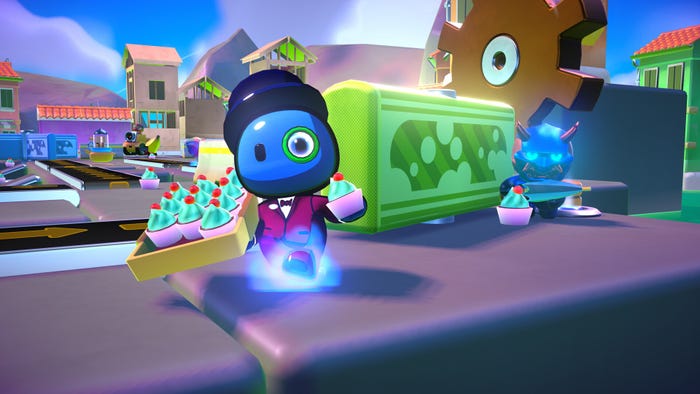
Featured Blog | This community-written post highlights the best of what the game industry has to offer. Read more like it on the Game Developer Blogs.
How Nintendo's Tomodachi Life stepped on the land mine that is identity and politics in the 21st century: What the game is, and why things happened the way they did.


I married Amy Farrah Fowler. I didn't want to, but I didn't have a say in it.
That's what happens in Tomodachi Life, the new game from Nintendo. You dump your friends, loved ones -- and beloved TV characters, if you're my husband -- into it. Once you do, their simulacra begin to act independently, doing stupid things -- things which you have little or no control over -- and you laugh about it.
That's the intent, anyway.
Things got significantly less whimsical this week, when a controversy that's been bubbling since late last year came to a head. Before the game was announced for a Western release, reports suggested that Nintendo had patched same sex marriage out of the game; worse yet, that it had been classified a bug. That turned out not to be strictly accurate. Same sex marriage is, however, still not possible in either the released Japanese or the forthcoming Western versions of the game.
So?
In the early part of the 21st century, marriage is the flashpoint at the junction of identity and politics. Same sex marriage has become one of the biggest topics of 21st century American discourse.
Marriage is important to Americans: We marry more than many other first-world countries, where marriage rates are dropping. Individual identity, too, is a particular fascination with Americans: We are who we choose to be, and we spend a tremendous amount of effort to do it. (Try marrying a European, as I have, and you'll find that the American perspective on this is not as universal as you might assume it to be.)
The fight to be able to express one's fundamental identity as gay -- publicly, and without fear of retribution -- consumed the gay rights movement for years. The freedom to marry the one you love, and assume the same rights and responsibilities as everyone else, has come to define the the movement in more recent times.
It's not hard to understand, then, why the Tomodachi Life thing blew up the way it did: When it comes to the gay rights movement, marriage and identity are politicized and have become intertwined.
Think about it. At the same time Nintendo is apparently promising a means of self-expression (or even self-insertion!) via its Miis, it seems to be breaking that very same promise -- in the first game it has released which appears, at first blush, to simulate real life.
At any other time in the evolution of the game industry, Tomodachi Life would have been treated as the goofy little curiosity it is. But with the world of game criticism expanding thanks to the democratization of the means of expression, controversy around the game became a fait accompli.
So, what the hell is Tomodachi Life?
My husband's been playing Tomodachi Life, because Nintendo of Europe has already distributed it to the press for coverage purposes. I've seen it because, well, he's my husband.
The game is atypical, and it's a bit hard to get until you see it in action. While the Nintendo Direct that served as its announcement is certainly representative of its mood, it doesn't do much to make the game itself comprehensible.
If you remember Tamagotchi, start there. But instead of a weird little alien chick, the virtual pets happen to take the form of whatever Miis you bring into the game. The player assigns them basic personalities (from templates) and, from there, they (including the Mii based on the player) act pretty much autonomously.
It's almost immediately apparent that the game was created not as a simulation of life or social interaction as much as it is meant to be a comedy sandbox: "She married him?" Marriage is an option not because the characters are meant to be living realistic simulated lives, but because it's another opening for a punchline. It's more banal but no more real than this "news story" from the Japanese version of the game which stuck my Mii's head on the body of a deer.

Everything is amped up in the manner of Japanese television. If you aren't familiar with Japanese TV, count yourself lucky. Japanese TV gave us America's Funniest Home Videos, which is all you really need to know for the purposes of this article.

Tomodachi Life is dumb but it's clearly supposed to be dumb, in other words: It's a lowest common denominator comedy generator as a game, not a serious simulation. It is a vague approximation -- a gesture toward a thing that isn't even really there. These aren't really your friends, and they aren't really living lives. It's not even really a game; it's a toy. It's a virtual anthill as Chuck Lorre might envision one, by way of Japan.
So why the big deal?
In December, reports surfaced that same sex marriage was possible but was being patched out of the Japanese version of Tomodachi Life, well before Nintendo announced it had plans to localize it for the West.
Since the game's Western release was announced last month, Nintendo has been forced to clarify this issue, and has opened up to a couple of different journalists about it. You can find responses from Nintendo of Europe here and Nintendo of America here. The game never had same sex marriage, they say -- Westerners were confused by badly translated patch notes and misconstrued screenshots.
Japanese players were to blame: "Essentially they would create a male version of a Mii character and assign their gender as female, and that was how the two males were able to have a baby," Nintendo's Bill Trinen told IGN. The rest? Save file corruption bug fixes.
Things came to their inevitable head this week when Nintendo released an incredibly tone deaf statement to the Associated Press: "Nintendo never intended to make any form of social commentary with the launch of 'Tomodachi Life.' The relationship options in the game represent a playful alternate world rather than a real-life simulation. We hope that all of our fans will see that 'Tomodachi Life' was intended to be a whimsical and quirky game, and that we were absolutely not trying to provide social commentary."
The problem is that this option does not exist. As Patrick Klepek put it, "I hope Nintendo knows that excluding gay relationships is, in fact, a form of social commentary. It's inherently political."
Why does Nintendo's statement rankle? It speaks to a basic truth of gay life: Straight people don't understand our lives -- that living, for us, is an inherently political act. If you think this is an exaggeration, you've never had to push down a quaver to clearly and calmly say, in an obviously male voice, "my husband" to a customer service phone rep at an insurance company, or had a government official ask which one of the couple is "the bride" when he's filling out a form, only for him to abruptly realize the absurdity of the question when he notices your expression.
Worth considering also is the idea that regardless of whatever the Japanese version supported or did not support, the Western edition of the game should incorporate same sex marriage in the name of cultural adaptability and fairness. I am not unsympathetic to this perspective, of course.
On the other hand, you must also consider the much larger political problem the company would have on its hands if the same sex marriage switch was simply flipped. In considering this, the anarchic, sandbox nature of the game must be considered, too: As the player, you can't really make anybody do anything.
A simple problem becomes instantly complicated. Should Nintendo make an option so that players can set their Mii as bi, gay, or straight? Should it enable gay marriage by percentages that reflect real-world homosexuality rates? Should marriages only happen if the player okays them? Or should players be offered a bunch of options? Must Nintendo put all of these options behind an age-check barrier so as not to alienate the parents of its younger customers, given the political climate?
Of course, you have to struggle not to cynically assume that a deliberate decision was made to throw a minority under the bus -- to avoid a big headache by creating a small one.
When Animal Crossing: New Leaf came out, there was a much smaller outcry around the fact that the game doesn't support a variety of skin tones in its character creation: All you can make are characters that appear to be caucasian. (Well, to Westerners, anyway -- they appear to be cartoony Japanese to the Japanese, judging from the fact that both territories use the same box art.)

I was extremely sympathetic to this criticism of the game, despite my well documented love for it. There's no good reason that this choice shouldn't be implemented and every reason it ought to be, especially given its technical triviality. It's easily explained as cultural shortsightedness on the part of the original Japanese development team, which is racially homogenous.
My feelings get murkier with Tomodachi Life.
Encountering the game and seeing it for what it is definitely helps. It's no platform for self-expression or personal creativity in the way that Animal Crossing is. I've written about how Animal Crossing is a safe place to explore your identity. That turns out to be backed up by the creators: "The concept of the game is that you've got your real world, but there's another world where you can go in and express yourself freely… That's the core concept of Animal Crossing," producer Katsuya Eguchi told me recently.
Tomodachi Life just isn't intended the same way. It does not have that possibility space. You can't even exert much control over it. To see it in action it is to immediately understand that.
At the same time, no matter how shallow, we expect our pop culture to reflect reality as it is, not as its producers envision it. Demanding that it does has long been a tool for social change.
It's difficult to dismiss this argument; at the same time, I think applying it to Tomodachi Life is giving the game a lot more heft than it actually has, which is easy to do if you haven't actually seen it up close.
A man and a woman
Funnily enough, what bothered me was not so much is the omission of same sex marriage, but the enforcement of heterosexual marriage: The idea that whether I wanted it to or not, my Mii -- an image that has represented me since the Wii launched eight years ago -- would marry a woman.
That, in some way, seemed to vacate my identity. Not just that: For a second, it almost seemed like it would eradicate my marriage, much more thoroughly than the impossibility of getting married to a male character would.
Marriage is far from trivial to most, but to me, it has a specific significance: The marriage I entered into late last year wasn't even a legal possibility six months prior to the ceremony. My husband is a foreign national, and it was only the invalidation of Section 3 of the Defense of Marriage Act -- which we waited for in pain and hope -- that made it possible for us to get married and be together. We worked hard for this.
I don't want to put too much significance on this: When my Mii married Amy Farrah Fowler's Mii, I protested -- but my husband and I laughed together. We have the luxury to laugh, though. We're already married in real life.
The PR disaster
In the end, it comes back to identity and marriage, and their totemic power for many gays. Like many others, it is impossible for me to sideline my feelings. We have internalized the idea that to suppress our identities is to betray ourselves. This is what Nintendo showed a lack of understanding of in its response to the Associated Press.
Nintendo hasn't often had to tread this path before. The company's American branch has rarely, if ever, had to contend with serious discussions of its in-game content: Nintendo's games have largely focused on fantasy worlds and scenarios. More significantly, it's used to shipping mainstream games to mainstream retailers and its communications beginning and ending with a coordinated marketing effort.

I don't doubt the potential for Nintendo's developers to be able to solve this issue through a mixture of clever programming and game design -- that's what they do for a living. But it's not going to happen for this first release of Tomodachi Life. The Japanese game shipped ages ago; the Western version has been through localization and testing. The promotional contracts with Christina Aguilera and Shaquille O'Neal have been signed. Nothing is going to change.
For now, the tool Nintendo has at its disposal is public relations, and that's the company's Achilles' heel.
Nintendo should have considered what would happen long ago -- certainly no later than December, when Western news reports began to surface about the Japanese patch, and reactions to that became clear. A strategy could have been crafted to mitigate, rather than maximize, the damage.
The whole situation seems to be the product of the worst kind of naivete: The naivete of people who should obviously know better, which is the most brutal kind.
Conclusion
In the end, I find it difficult to sum up all of my feelings and thoughts on what Nintendo could have done or should do with Tomodachi Life into a neat package. Things are more complicated than that.
I'll leave you with an observation instead: There's a world out there that these games enter into once they've been completed, and Nintendo can show a surprising lack of understanding of that, sometimes.
In Japan, it's easier: Things are a bit smaller and more manageable. It's easier to pretend they are, anyway. In the West, the company is swiftly finding that the reality it lives in is not the one it wished for, and that is something that applies not only to Tomodachi Life.
Read more about:
Featured BlogsAbout the Author(s)
You May Also Like








